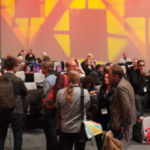
Back in 2007, a group of five current and former students of the University of Washington’s (UW) Information School were having regular informal networking meet-ups at a local Seattle bar. Four of them were members of the Pacific Northwest chapter of the American Society for Information Science & Technology (ASIS&T), and they found they wanted to go beyond just hanging out at a bar and attending ASIS&T’s regional annual meeting, and to create a “highly collaborative, vibrant atmosphere where practitioners and students could share ideas and strengthen the local community of practice,” according to a 2008 article in ASIS&T’s bulletin by member and former UW student Aaron Louie.
That group of current students decided to take on the challenge, and launched InfoCamp Seattle that year. A two-day annual event most recently held at UW last Oct. 12-13, InfoCamp Seattle is designed for professionals and students in the information-science and technology fields, including user-experience (UX) professionals, graphic designers, librarians, and coders.
An unconference format is the cornerstone of InfoCamp. “The people that started this wanted an alternate format without having to submit proposals for a session at a conference almost a year in advance,” said Cadi Russell-Sauve, a faculty librarian at Bellevue College who served as a member of InfoCamp Seattle’s all-volunteer planning committee from 2009 through 2013. Instead, InfoCamp Seattle is divided into time slots — four blocks of six 45-minute sessions on the first day, three blocks of six 45-minute sessions on the second — but no content is set by organizers in advance aside from the keynote and a plenary address. Participants then create the agenda on site, signing up to lead sessions on topics they are interested in on a large paper schedule in the common area of UW’s Mary Gates Hall.
InfoCamp Seattle has been very successful, now drawing nearly 300 participants from the local area and beyond. But that’s just the beginning. Organizers want people from other cities to start their own InfoCamps, and encourage out-of-town attendees to talk to them on site. So members created the InfoCamp Starter Kit, a PDF that outlines the planning process to help those who want to host their own event. “It says, this is what we’ve found works in the seven years that we’ve done it,” Russell-Sauve said. “But this is not prescriptive. It’s guidance should you need it.” So far, InfoCamps have been established in Portland, Ore., Berkeley, Calif., North Carolina, and Berlin.
“We really wanted to have a local event,” Russell-Sauve said, “because our primary concern was building a local community of information professionals. We want those who are searching for something similar to build that in their own communities.”



